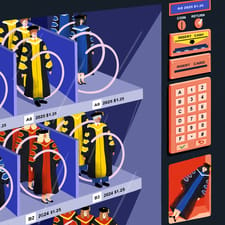And that's how I became a dime-a-dozen.
Why I opted out of academia after my Ph.D.
By Frances Gia Phung An
Illustration by Xinping Li (used with permission).
The examiners’ reports for my Ph.D. thesis in Psychology came while I was queuing up at Norwegian immigration after 26 hours of flying from Sydney to attend a conference. Despite the favorable result, this was also the moment I heard the doors of an academic career closing: I had reached the end with little to show for it on my CV.
I didn’t author the “right” articles that would land into prestigious peer-reviewed journals. In earlier years, my supervisors reassured me that success would come with time. Don’t worry, they told me, you’ll be able to find a journal in the second year, third year, fourth year…
This deadend didn’t surprise me, because obtaining success in academia seemed impossible. An academic’s worth depends on the number of peer-reviewed publications, which requires peer reviewers – but academics are notoriously overworked and unable to volunteer their time for peer review.
It didn’t help that my research topic (data falsification among market researchers) was quite niche. Yet somehow my classmates were able to get at least one or two papers out of their theses. I could only assume that failure reflected my own subpar scholarship.
But was I the failure? I had grown skeptical of the peer-review system, which promised an objective path to “truth” but seemed to simply feature anonymous academics taking a power trip to share their opinions. One hour before my first thesis submission attempt, I received a rejection and brutal criticism from ten reviewers on an article (adapted from my thesis’s second chapter) that had already undergone a round of edits before being sent out for review again. My primary supervisor reassured me it was unusual for articles to be sent out for two rounds of revision and end up with a total of 10-12 contradictory reviewer comments. Yet my Ph.D. examiners’ written comments on this chapter had been the most favorable compared to the other chapters.
It wasn’t just the written work. On the professional front, I didn’t go to the “right” conferences and enter the “right” networks. None of my internships or funded conference opportunities came through my Ph.D. Most were from activities conducted with conservative and libertarian think-tanks.
Part of me wishes this was a red pill story about how woke academia discriminated against my political beliefs. That would allow me to blame “the system” and minimize the sense of personal failure. However, my supervisors were very aware of and open towards my political beliefs and interests, even if not aligned with theirs.
Occasionally, there were awkward moments with classmates who asked, “Why the fuck would anyone vote ‘no’ on the Voice To Parliament referendum?” (a constitutional amendment that gives Aboriginal and Torres Strait Islander representatives a say in certain laws and policies) or equated terms like “right-wing” and “conservative” with “evil” and “scary.” I lied about attending “the launch of my supervisor’s textbook” when I was really going to seminars on libertarian economics or conservatism. My wardrobe gradually divided itself into outfits for left-wing and right-wing events. Looking in the mirror, I laughed at the dramatic irony, like an audience member watching a play she was acting in.
I had grown skeptical of the peer-review system, which promised an objective path to “truth” but seemed to simply feature anonymous academics taking a power trip to share their opinions.
To be clear, my ultimate decision to exit the academic circuit was entirely voluntary and due to aspects mostly within my control: I took too long to understand the metrics game, then, upon learning, refused to play. I was fine with being ordinary. But there didn’t seem to be any opportunities for dime-a-dozen Ph.D. students in academia. All my postdoc applications had failed. Ordinary was equivalent to mediocre.
Having already decided against an academic career, the first 20 minutes of my viva voce (oral defense) resembled a hostage situation. During my opening ten-minute summary of the thesis, I put on my best intellectual register, which is really just a budget British-Australian accent. My aim was to scrape into the pass zone, finalize my thesis, and then permanently leave the university environment. Already queasy from overeating sugar-free marshmallows, I waited for the examiners to humiliate me with impossible questions, then kill me with the suspense of waiting for their verdict.
Instead, the examiners praised my theoretically attuned approach to a relatively overlooked topic. We collegially discussed the history of marketing and grounded theory approaches, concepts that I had explored primarily through independent reading due to the lack of expertise within my university’s psychology department on these topics.
At some point, one examiner rolled back to grab a glossy book from his shelf to show us over Zoom, saying, “This textbook is basically the marketing bible. It’s over a thousand pages long and only one page is dedicated to data falsification. Your thesis could be the start of a long and interesting academic career. This is completely tangential but what do you want to do after your Ph.D.? Do you want to continue in academia?”
I paused. The discussion reminded me of aspects that had attracted me to academia: connections with people who were interested in methodology, abstract thinking, and logic.
I had nested into a circle of theoretically minded mentors who saw my value as a person even when my performance on paper dropped. I had believed I was destined to become an academic, to pay back the favor.
Then I remembered the bleak prospects for people like me in academia and resorted to a diplomatic answer: “I’m interested in academic research but may spend a few years in industry first.”
My final grade was “pass, subject to substantive amendment,” which the examiner said “sounded bad but wouldn’t be too burdensome.” The changes required mainly included reformatting results and exploring my lived experience as a former market researcher, to the amusement of my supervisors who often (half-)joked about qualitative data being made up.
While looking up the steps to prepare a revisions report for the board, I came across Ph.D. forum threads of others who were devastated about their “pass with major amendments” result. What was the huge fuss between “minor” and “substantive” about? Was I stupid for being happy with my pass grade? Was there some unspoken element in my examiners’ seemingly positive evaluations that I should have decoded as “This is the worst piece of shit I have ever seen”?
The snobbery about different pass grades reminded me of the standards of academically selective high schools in Sydney. Anyone with a university admission ranking below 95.00 (out of a possible 99.95 ATAR score) was a disgrace. Being from a family of medical professionals and students, I was the only one of my cousins who fell below the 95.00 mark. My job was to slink into the shadows and live in shame.
Instead, I had nested into a circle of theoretically minded mentors who saw my value as a person even when my performance on paper dropped. I had believed I was destined to become an academic, to pay back the favor.
Although a failure by conventional measures, I wrote a thesis that transported me outside of my discipline and into the messy world of political tribalism and op-ed writing. Fumbling through unfamiliar research literature made mistakes inevitable. An economics professor sniggered during a presentation when I referred to Adam Smith a “neoliberal thinker.” But the feedback and occasional humiliation enhanced my intellectual agility and personal resilience. I learned that authenticity trumps prestige when my close allies and I defended one another during cultural and political wars. They stuck by me, even when others saw me as a deplorable with no trophies to make up for it.
By the end, shaping oneself into a model academic sounded like the high school drudgery of learning syllabus dot points and using arbitrary numbers as measures of one’s intelligence and self-worth. I had diplomatically told my examiners that I would spend a few years in industry. But what was out there for Ph.D. students who opted out of the game? Employability workshops are either aimed at Ph.D. students aiming to push through the bottleneck of postdoc hiring processes or early undergraduates trying to get their first office job. I was a loser under academic criteria but also had no idea how to market the research skills I had gathered to make me an attractive candidate for a “regular” job, based on the hundreds of rejections I received on Seek.com.
Ph.D. students fall prey to the Instagram versions of their classmates’ success. We only see the classmate who somehow in their second year impressed the Nobel Prize-winning sage of their subdiscipline and became their pet co-author. We focus on peers who land overseas postdoctoral opportunities before theses submissions. We focus on those who have landed massive grants allowing them to jet off to prestigious conferences and come out first-authoring ten award-winning papers in top journals.
Lost in the humblebragging of stellar students’ LinkedIn and Twitter posts are all the ordinary, the mediocre, the dime-a-dozen Ph.D. students. They disappear, knowing that others will scoff about the “wasted four years of life.”
A friend who finished a Ph.D. in the natural sciences and also decided against a career in academia told me, “I don’t regret doing my Ph.D., but if I could go back, I wouldn’t do it.” I wouldn’t say that I wish my Ph.D had never happened: it was the best option at the time. But the exit options are bleak, as though a curse chases those who try to leave the circus.
